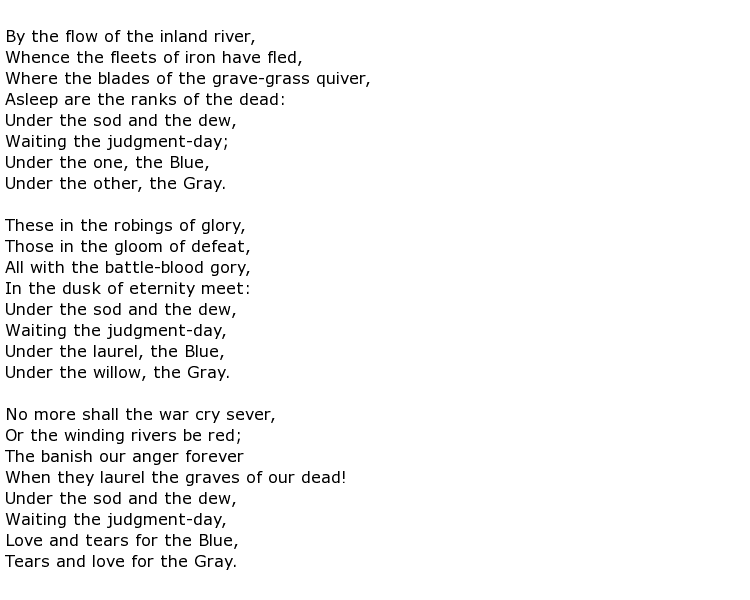 Francis Miles Finch was a US poet, academic and judge. He also served under President Ulysses Grant as a collector of internal revenue for the Twenty-sixth District, New York but this appointment lasted only four years when Finch resigned his post. His most famous literary work would probably be the poem
Francis Miles Finch was a US poet, academic and judge. He also served under President Ulysses Grant as a collector of internal revenue for the Twenty-sixth District, New York but this appointment lasted only four years when Finch resigned his post. His most famous literary work would probably be the poem

which is the story of reconciliation and unity after the bloody Civil War.
He came into the world on the 9th June 1827 in Ithaca, which is a suburb of New York, an area once populated by the indigenous people of the Cayuga tribes. He was the son of a successful merchant and his parents made sure that he had a good education. This began at the Ithaca Academy and he then went on to study at the famous Yale University. He excelled here as a scholar, public speaker and writer, for a time editing Yale Lit magazine on campus. His success at Yale meant that he was able to call himself a “Bonesman”, being a member of the infamous Skull and Bones secret society of undergraduates.
Finch graduated from Yale at the age of 22 and returned to Ithaca to take up legal practice in the town. He was a very successful lawyer and carried on his college speaking prowess into the outside world, often being asked to address political audiences both during and after the bloody Civil War. He also became Secretary on the Board of Trustees at Cornell University and enjoyed close friendships with two of the university’s founders – Andrew Dickson White and Ezra Cornell. Finch was fiercely protective when it came to the university occasionally coming under fire from outside critics and he wrote a number of inspirational songs that Cornell students could sing in praise of their institution.
He could have dedicated his life entirely to legal matters but chose to be a writer as well as a lawyer. Between 1880 and 1895 he served as a judge, initially at the New York Court of Appeals. In 1891 he was elected Dean of the Cornell Law School. In truth his literary life was secondary to his other interests and he was quoted as saying that his poetry was

He was inspired to write

when he witnessed women in Columbus, Mississippi tending the graves of soldiers from both sides in 1866. The country was still divided to some degree by the war, but this act of reconciliation touched him and he wrote the poem. The opening verses are reproduced here:

Finch had the opportunity to take a chair in rhetoric literature at Cornell University but, for the reason quoted above, he didn’t consider himself a serious enough writer to occupy such a position. He married in 1853 and his wife Elizabeth bore him a son and 2 daughters.
Francis Miles Finch died on the 31st July 1907 at the age of 80. Friends ensured that his name as a poet lived on when they had a collection of his best poetry published two years later under the title


